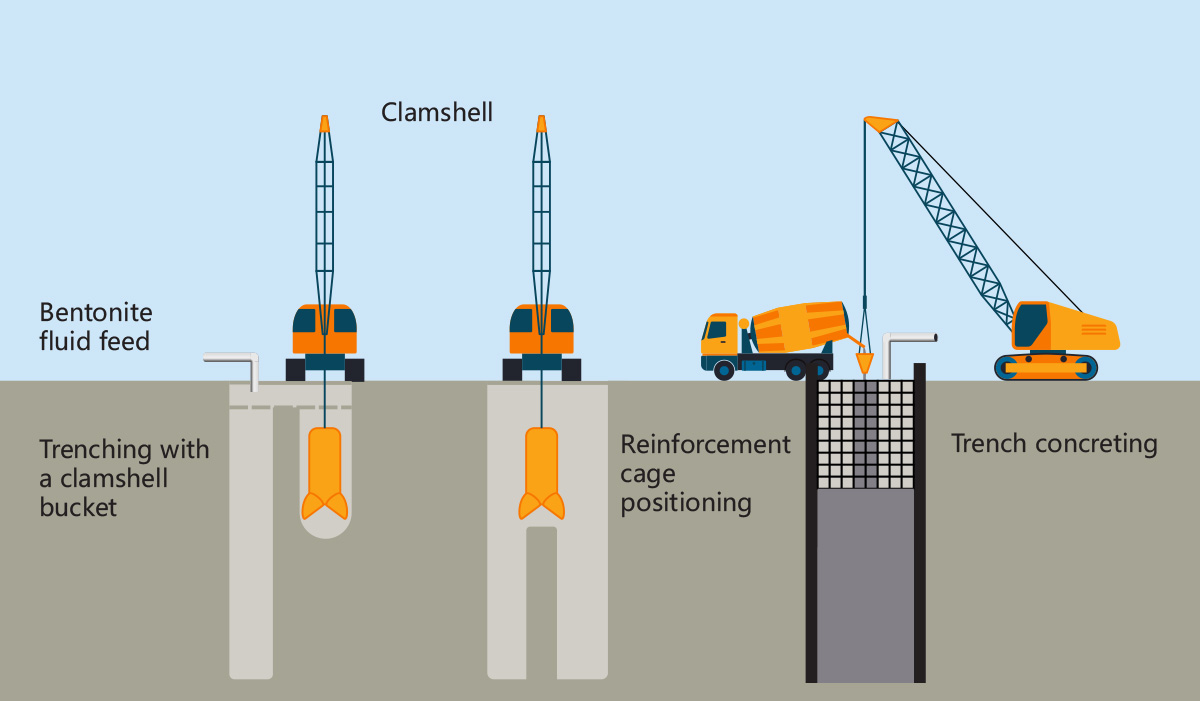Clay powders (PBM-18, PBM-20, PBM-22)
Bentonite, as well as bentonite-based suspensions, are actively used in a wide range of construction works:
- tunnelling, including tunnels for subways
- construction of diaphragm walls
- cracks sealing and filling voids, including in the construction of hydroelectric power plants
- waterproofing in the construction of foundations
- creation of waterproofing screens.
When constructing tunnels in difficult engineering and geological conditions (floating unstable soils, significant groundwater pressure, etc.), tunnel boring mechanised complexes (TBMC) with hydraulic loading are used.

During TBMC tunnelling, a bentonite slurry with strictly regulated properties is injected into the bottom-hole area under pressure, which enters the ground under pressure, seals the tunnel face, preventing subsidence and rock fall. In addition, bentonite slurry functions include removal of drilled rock from the face, lubrication and cooling of tunnelling equipment.
When constructing structures in dense buildings, bentonite slurries are used as part of the diaphragm wall technology.

The diaphragm wall technology in the construction of underground structures is that to keep the walls from collapsing, the trench is filled with clay solution as the soil is excavated from it. The clay solution, having low viscosity and high claying ability, penetrates into the ground and colmatises the trench walls, forming on their surface a thin – 0.5-3 mm but dense and strong cake, and prevents collapse of the trench wall until the moment of lowering the reinforcement frame and filling the trench with concrete. The finished structure, once the concrete has gained strength, can serve as a load-bearing element of the foundation, an enclosing structure for the walls of the underground structure, as well as an impervious curtain preventing groundwater access to the buried operating structure.
Due to its sealing, plasticising and penetrating properties, bentonite is widely used in injection and grouting mortars, which are effective for sealing cracks and filling voids. That is why bentonite is an important material for construction of hydroelectric power plants, dams and dikes, canals, ponds, basements of residential and industrial buildings.
For the whole range of construction works Bentonite Group of Companies produces the following grades of clay powders: PBM-18, PBM-20, PBM-22. They are developed according to the recommendations of the Branch of JSC CNIIS ‘SIC Tunnels and Metros’ in accordance with Russian quality standards in accordance with TU 5751-001-41219638-2010.
| CHARACTERISTICS | GRADES | ||||
| PBM-22 | PBM-20 | PBM-18 | |||
| Moisture, max | % | 10 | 10 | 12 | |
| Wet screen analysis: residue #0071, max | % | 2,5 | 2,5 | 3,5 | |
| Slurry yield, min | m3 | 22 | 20 | 18 | |
| Plastic viscosity, max | concentration 64 g/l | mPa*с | 10 | 10 | 10 |
| Yield point, min | bentonite 64 g/l | Pa | 7 | 6 | 6 |
| Apparent viscosity, max | с | 40 | 40 | 45 | |
| Fluid loss API, max | cm3/30 min | 20 | 20 | 22 | |
| Cake thickness, max | mm | 1,5 | 1,5-2 | 4 | |
Interesting fact: filtration cake with thickness of only 1.5-2 mm, formed during the use of bentonite-based construction drilling fluids, keeps the walls of excavations up to 30 metres deep and more from collapsing.